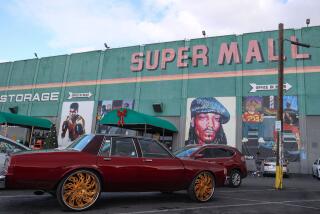UNDERSTANDING THE RIOTS--SIX MONTHS LATER : Touched by Fire / A Legacy of Pain and Hope : THE LESSONS : Easing Tensions Is Sometimes as Simple as a Smile
For many Californians, the riots were more than a momentary blip on the screen--they were a flash point for lasting and fundamental changes in their lives. The devastation left a legacy of broken dreams for many, awakened a sense of social justice in some, unleashed anger and hatred in others, and rekindled a spirit of hope among others. Six months after the riots, Times reporters visited some of the people and places touched by the extraordinary events of last spring and on these pages we tell their stories.
It’s 9:30 a.m., and John Kwon has already been at work for 2 1/2 hours.
“Good morning!” he calls out cheerful ly, as if the woman now entering the store were his first customer of the day.
“Good morning,” the woman answers politely, but with much less enthusiasm than Kwon’s chipper salutation.
She walks through the aisles, picks up a newspaper, a package of tissue and then stops in front of a fluorescent orange sign with rows of watches attached to it. Bold black letters promise “perfect time” and a one-year guarantee.
“How much is this watch here?” she asks, pointing to a black one with gold-colored trim. Kwon places the watch on the woman’s arm, she examines it carefully, and for the next several minutes Kwon and the woman talk--about the virtues of the $19.99 watch, about an expensive watch that she got for her birthday that will cost $70 to fix, and about watches in general.
In the end the woman is pleased with her selection. Kwon rings up the bill, she pays, and they both say, “Thank you.”
Things have certainly changed at Hubert’s Liquor Store.
They are subtle changes, some might say--a smile, a greeting, light conversation--but they are the kinds of changes that can, in tense times, help determine whether misunderstandings will be quickly quelled or will escalate and erupt in violence.
For the past 2 1/2 years, Kwon and his wife, Sun Gu, have owned Hubert’s, in the Crenshaw area on 43rd Street and Leimert Boulevard.
Last April, looters cleaned out the store’s inventory on the first night of the riots, taking about $70,000 worth of goods. But the market managed to escape the violence that leveled scores of Korean-owned liquor stores, including Dobson’s market around the corner. A heap of rubble now sits where Dobson’s once stood.
“I cried,” Kwon said, remembering that night. “(The store) is all I have. I said, ‘What can I do?’ ”
With the help of his family and his bank, Kwon reopened about a month after the riots, and that’s when he started to do some things differently.
Nearly everyone who comes to Hubert’s now is greeted with “Good morning,” “How are you?” and “May I help you?” Transactions invariably end with “Thank you” or “Have a nice day.” And in between, there is conversation about babies and wives and hitting the lottery.
This chitchat does not seem strained or forced, but it is more likely to occur now, both residents and Kwon say, than ever before.
Leimert Park resident Jack Coleman has noticed the difference.
“It’s better,” Coleman said sipping on a soda purchased at the store. “They’re more courteous now. They take the time to see what you want.”
During the riots, liquor stores owned by Korean-Americans were targeted for damage and destruction, in part, residents say, because the immigrant owners were largely viewed as rude and disrespectful.
Before the riots--and still at some Korean-owned markets--”they watch you like you’re going to steal something,” Coleman said.
The owner of one of the many black-owned businesses that line nearby Degnan Boulevard remembered the first time he went into Hubert’s after the unrest.
“I was shocked,” said Kisasi Ramsess, an artist with a studio nearby. “I used to go in the store all the time and they never said a word. Now I walk in the store and before I can get in there’s a great big ‘hello.’ I’ve noticed the change.”
It is not that the changes are earthshaking. Few would say that conversation and bantering make the high concentration of liquor stores in the city’s black neighborhoods any more bearable. Nor does it erase the tensions that still exist at other stores.
But it does make for a different atmosphere in this store, and that, some say, is not to be discounted.
“Little things like that make a difference,” Ramsess said. “People remember things like that. . . . It’s like a match being struck and it just misses being lit. If you keep striking, it’s going to light. If you keep it soaked with water, it’s going to be hard to light. . . . Sometimes that water is the kindness that you show.”
For Kwon, the changes are also a matter of good business. The idea of cordiality is not such a novel idea to him. He had tried to be cordial even before the city erupted in violence, he said. But now he makes a point of it, and he makes sure his other employees comply.
“We service the customer better than before,” he said. “(Since the riots) we call the customer’s name. We say, for example, ‘Yes, sir,’ ‘Yes, ma’am.’ I think in my mind, the customer is king. . . . After the riot we talk to the customers.
“I’m a businessman,” Kwon added. “That’s what I have to do.”
Shortly after leaving, the woman with the $19.99 perfect-time watch returns to the store exasperated, a little perturbed, but still good-natured.
“I couldn’t even get out of the parking lot before it broke,” she says, holding her $19.99, not-so-perfect watch.
“Really?” Kwon asks with a look of concern. He takes the watch back, and the woman picks out another one. This time it is burgundy with imitation eel skin.
“That looks nice for $20,” she says.
“It looks expensive,” Kwon offers.
The woman leaves happily, again, with a new watch and a new guarantee.
“The customer is king,” Kwon will say again and again.
In some ways his new catch phrase refers to the community as well.
There is no pay phone in front of his store. Residents thought it would be a magnet for trouble, so he did not allow one, Kwon said. And now he is careful not to post signs and advertisements on the outside windows of his market. Too tacky, residents said.
Before the unrest, Hubert’s already had one black employee, and he hired another when he reopened.
“He’s always done OK because he’s always had a black guy behind the counter,” said James Merritt, owner of a bookstore next door. “He was at least showing us the respect that is deserved. If you’re opening up a store in our neighborhood, you should hire some of the people in the neighborhood.”
Since the unrest, residents say, other area stores have started to do the same.
Jennifer Siegers comes to Hubert’s every day to buy a newspaper for her 11-year-old daughter, Natasha Hester. “She gets mad if I don’t get it, so I’ve got to get it,” Siegers said with a smile. “Every day.”
One recent Sunday, Siegers was short of money, but the cashier at Hubert’s allowed her to take the paper anyway. So on this day, Siegers came to pay her bill and say “thanks” again.
On a piece of cardboard torn from a cigarette carton and covered with neat black script, Kwon keeps a running credit tally. Customers are identified by their first names only. In some cases they are known by whom they are related to: “John’s wife” or “Mary’s son.”
“I know sometimes our prices are higher,” Kwon said. “People don’t have money. Sometimes (it costs) $1.05. He brings $1. What should I do? (I say), ‘Bring it next time.’ That’s the best way. If I say, give me 5 cents, then it makes trouble.”
Tyrone Adams, a regular at Hubert’s, jokes with Kwon and with other customers. After paying for his purchase, he turns to leave and then spots employee Chong Dal Kim( behind the counter. As if suddenly remembering that he has forgotten to do something, Adams turns and says with a smile:
“ Am yung ha sae yoo? “ (How are you?) Kim responds, “ Am yung ha sae yoo?”
More words are exchanged in Korean. Adams later explains that he learned the greeting from interactions with Korean-American friends, the same way he learned the philosophy that he lives by:
“It’s not black, white, Hispanic, Korean. It’s a person’s mentality. You treat a person right, they gon’ treat you right.”
More to Read
Sign up for Essential California
The most important California stories and recommendations in your inbox every morning.
You may occasionally receive promotional content from the Los Angeles Times.










